What Japan did in WWII - Myanmar
This series is from a local TV program in Japan to get closer to the real facts of WWII. For more detail, go to the prologue.
http://yellowpeep.blogspot.com/2005/12/what-japan-did-in-wwii-malaysia.html
You may think that it is one-sided history from Japanese perspective. So did I. Actually I've never been taught in school about the fact the TV says. And suddenly I realized that I am the one who only knew the other one-sided history. Let me know how you felt.
The staff flew to Myanmar.
Narator : One hour before Pearl Harbor attack, the fight between Britain and Japan already started. Landing on East Malay peninsula, Japanese troops headed themselves south and took control of Kuala Lumpur. They spent 55 days to reach Singapore. The battlefields shifted to Bilma, which today we call Myanmar. Yangon, the capital of Myamar, had been under control of Britain for 100 years before it was defeated by Japan.
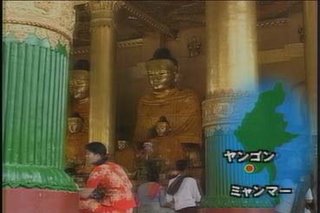 Narator: The Japan's purpose of penetration into Myanmar was cut off the supply route to China because of Sino-Japanese war.
Narator: The Japan's purpose of penetration into Myanmar was cut off the supply route to China because of Sino-Japanese war. 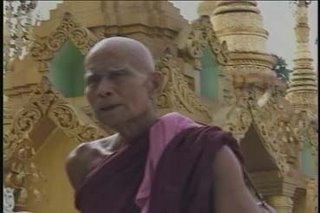 Narator: Shiroato (86) experienced the war against Britain in Malaysia, Singapore, and Myanmar.
Narator: Shiroato (86) experienced the war against Britain in Malaysia, Singapore, and Myanmar.
Shiroato : We've got a lot of stuff on our march from the people nearby. There were sugar sweets or water. When we take it, they seemed pleased. We were marching with a heavy sack on our back, so we sweat a lot, and the people gathered and offered us those food. Obviously they were welcoming us.
Narator : Any bad blood with those people ?
Shiroato : No way! The strict rule prohibits that. We did never abuse women and children. Plus, it's important to be kind to the inhabitants. That way, they may let us know important information.
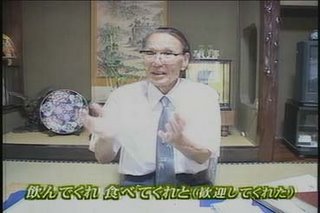
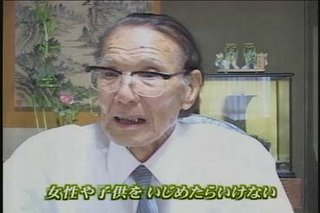
Narator : Is it true that Japanese were welcomed by Myanmar ? We talked to Teehan (80), who is teaching Japanese in Yangon and was a translator with Japanese troops sixty years ago.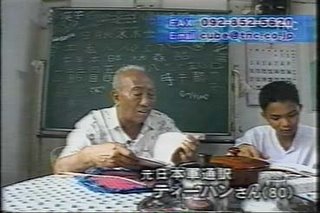
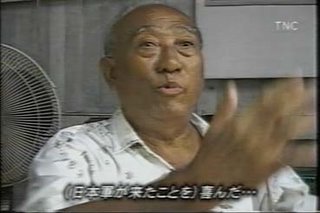
Teehan : Yeah, we were very pleased. With food like banana or muscovado. Japanese had never seen muscovado, so we showed them us eating it to say it's safe. We did the same thing for water. But they didn't drink water after all. It turned out they made a rule not to drink raw water. They had no problem of getting food for those reason except clothes. So they wore the clothes made of Myanmar's cotton. One day, an bomber was shot, and they captured the parachute. I still remember how they were happy to get that. Parachutes are a good material for clothes. ( lots of laugh including staff)
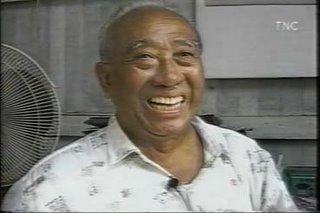
Narator : We went to Nyngegon nursery home to find elder women who remember the life with the Japanese troops.
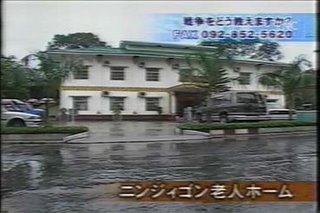
Torara (86): Japanese compound were the same as ours, apartments in front of the market here. I still remember a Japanese soldier adored my daughter very much.
Staff : Did you not suffer any brutal misbehaves by Japanese ? Such as rape?
Twetan (81): Never have I heard ! It was a very happy and tranquil time.
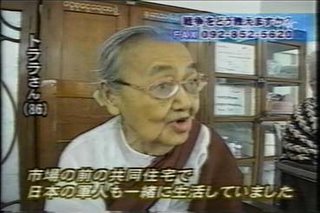 Tkinkti (94) : Japanese military people was very kind, plus we lived together in our neighborhood.
Tkinkti (94) : Japanese military people was very kind, plus we lived together in our neighborhood.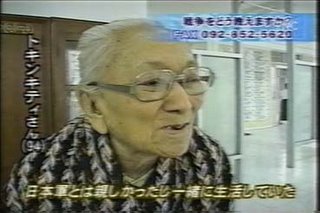
We landed Mandalay, the second biggest city in the center of Myanmar. It is also known as a stopping point to Imphal (a city in India) and which is why a fierce combat for the independenc of Myanmar was taken place. We went to "6th state school" to know how they learn the history of WWII.
The class began. The students rose up with their hands toghether, greeting to teachers.
Students : Thank you, president. Thank you teacher.
They are co-educated. Everyone wears a white cloth as well as teachers.
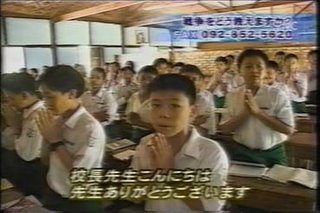 The class today covers the late 19th century when British occupied Myanmar. Teacher Sweswewin writes "GBCA (group of independence movement)" on the blackboard.
The class today covers the late 19th century when British occupied Myanmar. Teacher Sweswewin writes "GBCA (group of independence movement)" on the blackboard.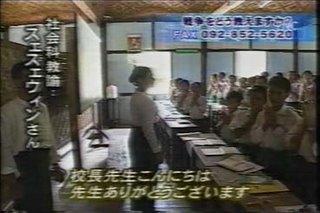
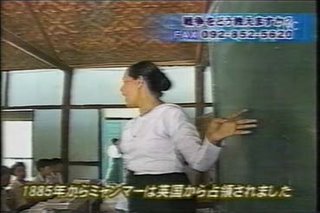 Teacher Sweswewin: Myanmar became occupied since 1885. How many times did they fight against Britain until then?
Teacher Sweswewin: Myanmar became occupied since 1885. How many times did they fight against Britain until then? Students : 3 times!
Teacher Sweswewin: That's right. What were people armed with ?
Students : Pitchforks, hoes, and bows and arrows.
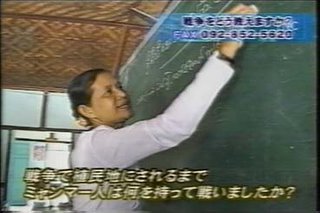
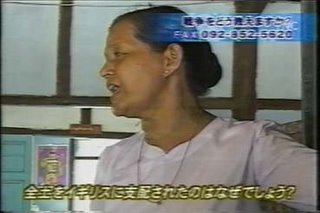 Teacher Sweswewin : What did GCBA demand to Britain?
Teacher Sweswewin : What did GCBA demand to Britain?
Stusent A : GCBA's taking part in politics, right of trade, and right to enter Mynmar's cabinet.
Teacher Sweswewin: Anyone who can tell why Myanmar conceded its independence to British?
Student B : Because the nation didn't have the system of military, and people fought with their pitchforks.
Reporter: What do you emphasize in teaching about what Japanese did 60 years ago ?
Teacher Sweswewin: I mainly teach them that Japan arrived in 1942, and it was an military aid what Myanmar wanted and asked to them to liberate ourselves from Westerners.
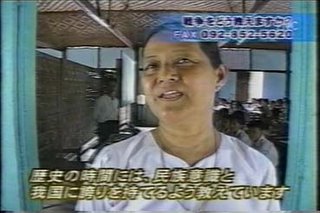
Narator : we obtained a copy of history textbook distributed in Myanmar. It writes the relation between Myanmar and Japan as follows: "Aunsan contacted Mr. Minami, a hiding member of Revolutionay Party, who turned out to be Colonel Suzuki. " It also introduce his picture, depicting him as a bridge between Bilma (former Myanmar) and Japan as well as 30 members of Burmese volunteer army, including Aunsan, as heroes who were trained by Japanese military for independence.
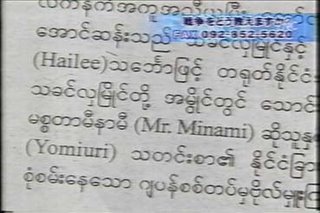
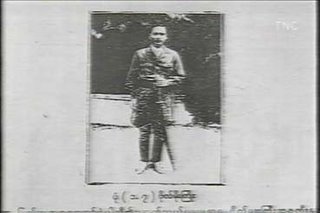
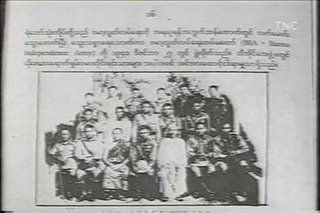 Narator : Ton Kain is the vice president of Myanmar's Ministry of Education. Fortunately we interviewed him about the time.
Narator : Ton Kain is the vice president of Myanmar's Ministry of Education. Fortunately we interviewed him about the time.
Ton Kain: I regard the war as a significant step in spite of a lot of blood. It is obvious that the purpose of the war Japan started (against British) was for liberation of Myanmar. Our schools teach students that way. In addition, we look Japanese with all deference to its economic revival after its devastated defeat.
Narator: In 1942, Japanese troops and the volunteer army commemorated the triumphal return to Rangoon, the former name of the capital of Myanmar.
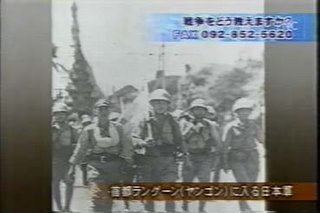
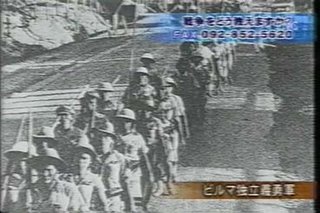 Narator : Tynnyo was one of those who were trained by Japanese military and participated in the independence war. After the war, he actively worked as a vice president of trade.
Narator : Tynnyo was one of those who were trained by Japanese military and participated in the independence war. After the war, he actively worked as a vice president of trade.
Tynnyo: I still appreciate the aid from Japanese for the indepencence.
Narator: However, the feelings of Myanmar seemed changed after they repeled British.
Tynnyo : It's true we got annoyed with some brutal Japanese, slapping across the face.
Narator: Peaken (78) was also the one who marched with Japanese.
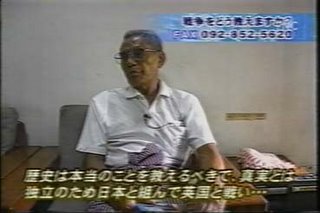 Peaken: We must describe the true history. That is, we fought against British with an alliance with Japan for independence, and we did another fight against Japan for the true independence because Japan attemped to take over British.
Peaken: We must describe the true history. That is, we fought against British with an alliance with Japan for independence, and we did another fight against Japan for the true independence because Japan attemped to take over British.
Narator: The people in Myanmar are in general dedicated to Budda. What flew into this Buddism country? What is the truth of what happend just 60 years ago. How do you think we should teach students about that war, WWII?
***********************************************************
You may want to know about Japanese military in other countries:
What Japan did in WWII - Malaysia (prologue)
What Japan did in WWII - UK
What Japan did in WWII - Myanmar
What Japan did in WWII - Indonesia
What Japan did in WWII - Taiwan
What Japan did in WWII - Palau
What Japan did in WWII - Korea
What Japan did in WWII - (epilogue)
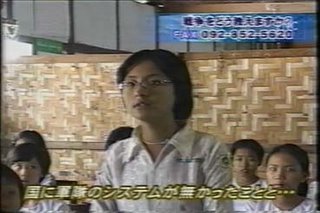
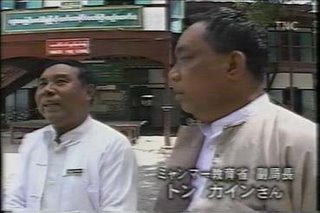
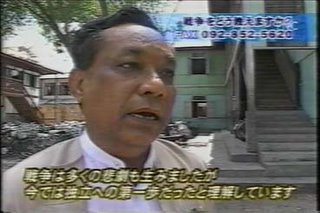
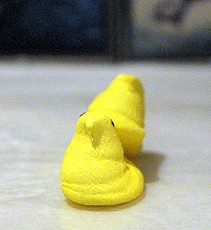

9 Comments:
日本語で投稿しちゃって、ごめんなさい。
記事を全部読ませていただきました。
(機械翻訳だけど・・・。)
一人の日本人として、あなたに感謝します。
これからも頑張ってください。
実はお客が少ないから、たたもうかと思ってます。どうやったらアクセス増えるのかな。
ブログランキングの上位からトラックバックして、英語で紹介してみたらどうでしょうか?日本のブログのランキング紹介みたいな?あと、実証的な解説を載せるとか(南京事件とかの)。よくわかりませんけど、たたむなんてモッタイナイです。
こんなのもあります。→ http://www2s.biglobe.ne.jp/~nippon/jogbd_h12/jog134.html
いろんな方法があるんですね。まだ、このブログはいろいろと変える必要があるので、もう少し経ったら挑戦してみます。
タイトルも変えちゃったしね。へへ。
明けまして、おめでとうございます。
新しいタイトルいいですねぇw
あと、Recent Comments欄を設けていただけないでしょうか?自分のコメントのあとがあるかどうか、わかりやすいと助かります。
明けましておめでとうございます。
タイトルで勝負です。
コメント欄、設けましたよ。ふふ。下にスクロールしてください。
コメント欄ありました・・・。(。-_-。)ポッ
すみません。
先日発売された『嫌韓流』というマンガですが、アメリカかイギリスの新聞でも話題になってましたよね。
あれも取り上げてみればどうでしょう?
最初のエピソードなんて、多くの日本人の共感を呼んだんじゃないでしょうか。
好感を持って善意を持って接していたのに醜いものを見てしまった・・・って。
なーんて、ただのリクエストなので、気にしないでください。
そうですね~。イギリス編を書いたんで、スペルチェックしたら韓国編を書いて終わりです。
嫌韓流は確かに候補の一つではありますね。それはNYTの大西に対する注意の喚起ということでしょうか。意義はあると思います。
ひょっとしたら日中戦争の内容になるかもしれません。
韓国編書いたらちょっと更新遅れますけど、どうぞ気長によろしくお願いします。
please give me your contact email so that i can seek your help in making WHAT JAPAN DID IN WWII- INDIA
Post a Comment
Subscribe to Post Comments [Atom]
<< Home